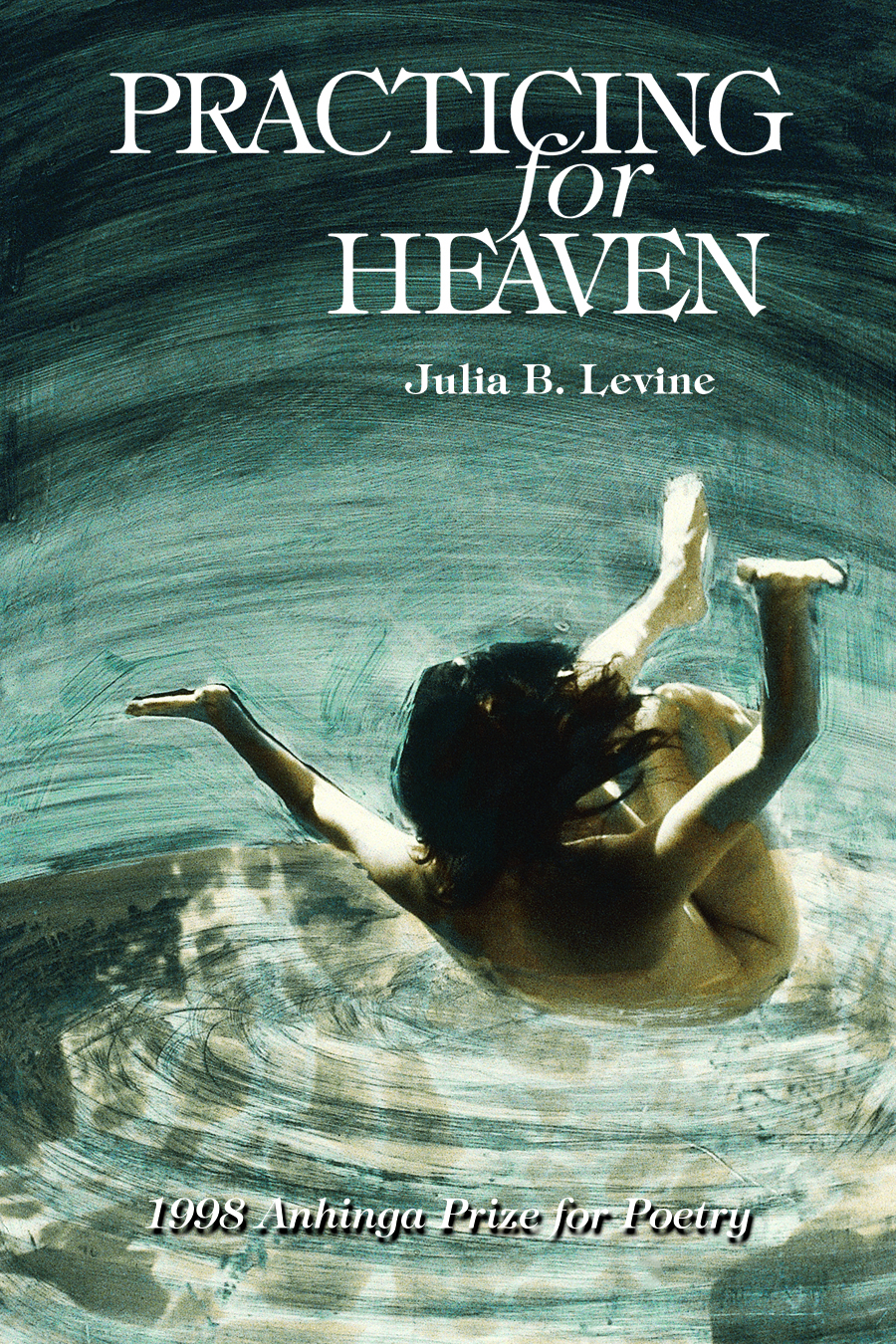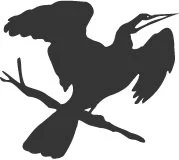
Practicing for Heaven by Julia B. Levine
Robert Dana-Anhinga Prize for Poetry (1998)
It's no exaggeration to say that reading Julia Levine's splendid first book, Practicing For Heaven, produces the illusion of living the life it depicts. Her image-rich, sensuous language combined with an unflinching faith in the power of specific detail create meaning viscerally rather than intellectually. Whether describing a walk beside the American River or a vigil at the bedside of a critically-ill spouse, Levine's poems reach us as directly as an infusion of blood. Hers is a delicate, elegiac, and truthful poetry with rare transcendental moments that the most cynical of readers can trust. -- Enid Shomer (Judge, 1998 Anhinga Prize for Poetry)
This is a luminous, breath-stopping book. Each poem is complete, each renders an intense encounter between the poet and what she loves: the "sensate world" in all its complexity of color, contour, and human emotion.... The eye makes us look while the words impel us toward feeling something of the poet's present -- a present charged with memories, hopes, and a sensitivity like that of the fontanelle: the soft spot on a baby's head invoked in one of the most striking poems in this brilliant first book. -- Margaret W. Ferguson
A lifetime of reading poetry tends to settle some of us more and more comfortably into those ‘ore-loaded rifts' of a few masters -- Dickinson, Horace, Keats, whomever. It takes a compelling new presence to return our attention to the plenitude of our own moment's efforts. Again and again I find this presence in the poetry of Julia Levine. More consistently than I could have imagined, her poems brim with a new and multi-faceted intelligence. I return to my own life hungry for more, wonderfully disturbed. -- Arthur Smith
My Gemini
Because she is waiting to be lifted
out of the silence of my unremembered life,
nothing can rinse her from what I carry
or how I travel these fields,
watching magpies scatter arrows into the sky,
and always knowing she slipped apart
from what was once seamless,
so that something of me, though torn,
would keep on arriving. Ahead of me
combines are spinning knives
deep into the ground,
leaving combs of threshed hay
to argue for a world that cuts everywhere.
This is how she wants me to walk,
steady and awake, into all that dies
before it can return, the last leaves
whispering further and further into silence,
these thistles bony with light,
and only the ravens black enough
to spill over with such a thin sun.
She wants me to touch it all,
knees bent in asters,
my fingers rattling petals,
remembering the months
she wrapped my mittened hand
back around the spoon, urging me to dig
down to the tiny locket
netted in the roots of our sugar maple.
She wants me to know even darkness
will speak if you listen, that each hidden word
asks to come to light,
that someday my body will call for her
to step back in.
Until then, she says,
we are practicing for heaven,
and this is how you get there,
the ladder built rung by rung
with the truth of whatever happens.
Nights on Lake Michigan
Downstairs, bitter voices wolved my door
and listening pulled the terror closer
until my room swelled with grim animals
stalking the forest around our cabin:
porcupines rasping bark off porch railings,
bats spitting darkness across the sleeping elms.
What child could have made another dream
from the bones of that cabin? At my window,
the lake soured into blackness. No moon yet.
If only I could have seen a path winding into morning
the way our rolling dock would stretch into the lake,
away from where my parents simmered in lounge chairs,
my mother tying up laces on three pairs of shoes,
my father devouring journals of disease,
his ear tuned to the peculiar music of the body's
pipes and strings. A path that would have led away
to where water held me as if my weight were sweet
and the underwater sand were rice paper
printed with tiny shells; away to where the wind rose up
as if someone called from the further shore,
whitecaps repeating my lost name. If only night
had been a smaller lake I could swim across,
where nightjars gently celloed in the rushes,
and sleep was how the silence borrowed me.
Fontanelle
1.
Stranded in that clockless month of her arrival,
I listen to our neighbor sawing down back doors,
and rock her, tiny fists of breath uncurling,
while the details of each afternoon are revealed:
that still hour before the mailman crosses the street
to unlock his grey tomb of letters, or after school,
children looking for a game to start, and finally
scarlet lights weeding the horizon,
when the men silence their tools and only darkness
bangs out across the empty lots. Now the homeless women
are shaking olives from roadside trees, black pellets
raining down on their plastic bonnets
as this room gathers us into the heart of the house.
Torn up from sleep,
without a memory of dreams, all that will remain
in the essential loneliness before dawn,
is blue milk running from my body
and the violence of her genderless desire
clamping down on my skin.
2.
And then as I stare mutely out the window
at the shut door of the world, there is a night of weather,
trails of light scarring blackness, pelting whip of rain
rattling the fenceline. As giant conifers
crack and fall in the cemetery, the dead around us
unable to hold onto that last tangled handful of roots,
I begin my journey through each child's room,
knowing I am not tending their fear, but my own,
that I will never again travel far enough away
to be injured, to feel wilderness jar against me.
I count the miles between lightning and thunder
as the distance narrows and then widens in retreat.
And when I return to summon you up from sleep,
how desperately I want that brief moment of overlap:
when what was seen can finally be felt, that brilliant flash
when the self finally marries what it was
with what it has become.
3.
As she begins to arrive within her body,
I dare touch the fontanelle,
a vein visibly pulsing under that taut canvas,
tiny plates of skull still undone. Outside,
empty songs of the builders' hammers
flush a handful of crows into the sky. All winter
between rains searing streets into rivers,
sandbags packed around the sewer's roaring throat,
workmen waited inside steamy cabs of their trucks
to forge that blue carbon into a neighborhood.
Now when I take her out among the dark scars
of newly rolled streets, sidewalks not yet lined
with chalk drawings or paired initials,
her eyes without vocabulary,
a hare bounds out ahead of us,
dark-tipped ears sliding between wall guides
of new houses that stand open, without secrets,
a forest of forms not yet fully seen:
the world just before it can be known.

